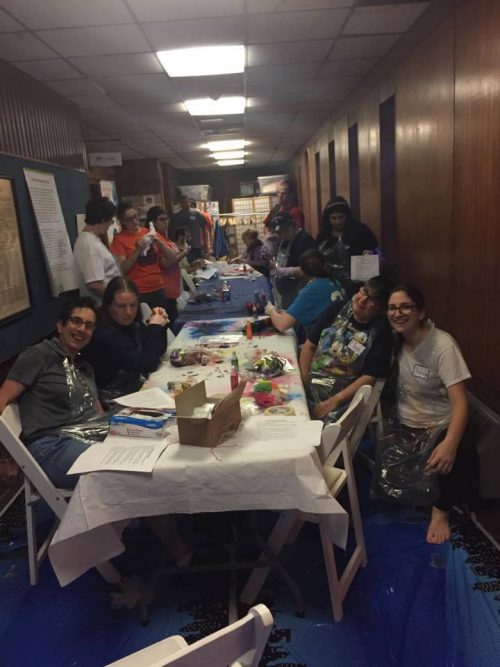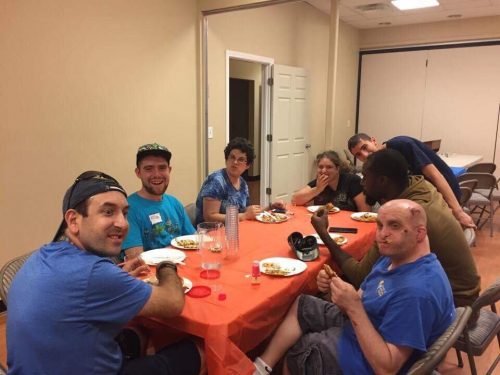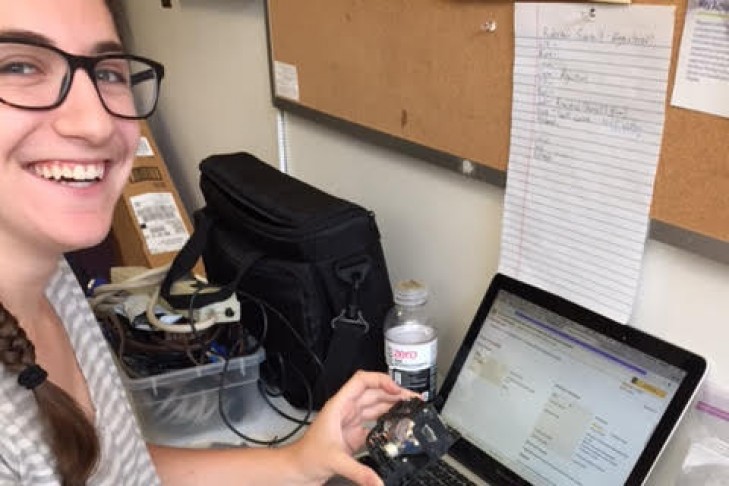The first important lesson I learned this summer involved gluten-free animal crackers: If the first ingredient of the crackers is pea starch and they went bad a few months ago, they are still animal crackers, so eat a few before you realize that it is probably best to throw them away.
In all seriousness (not that that lesson was not serious, because I strongly recommend you take my advice), learning is always something I have felt a strong love for. I have always looked forward to the first day of school, school shopping is the highlight of August, I hate it when class is canceled, and, yes, I have read parts of my textbook for fun. Classroom learning is what I love, I love filling my brain with facts, I love looking over my notes to see what I have learned that day, and having brain-hurting, thought-flying, absolutely amazing classroom discussions where the class continues the discussion in the hallways because the bell cut the discussion short. This traditional classroom-based environment is what I have always thought of when I heard the word “learn.” I have always known in the back of my mind that experiential learning is important and enjoyable, but I had never understood or experienced just how important and fun it is until this summer.
There have been two parts of my summer that have worked hand-in-hand to teach me all of these lessons. One of them has been my internship at Yachad and the other has been my experience as a Diller Teen Fellow. Yachad is an organization that plans activities for individuals with disabilities as well as mainstream individuals. The goal of these programs is to bridge the gap between mainstream individuals and those with disabilities. Needless to say, this goal is achieved for anyone who attends a Yachad event. When you go to your first Yachad summer event, it can be scary interacting with people who are different than yourself and communicate in a way that is different than what you are used to. However, within the first 10 minutes, all of those fears disappear as you are making new friends and learning new lessons left and right. As a Yachad intern, I complete small tasks such as putting together the yearly calendar, putting receipts in order, and dismantling projectors to learn what bulb type it needs. However, that is not all I do: Josh and I have also been tasked with planning some of our own events and attending summer Yachad events, such as Pizza and Parsha and Zumba.

As a Diller Teen Fellow, I had the opportunity to travel to Israel to further explore the four “Diller Pillars:” Leadership, Tikkum Olam (bettering the world), Jewish Identity, and Israel, as a part of a 15-month program. Diller is a Jewish, pluralistic, leadership program that connects high school students from Israel and communities all over the globe, including the U.S., Canada, Argentina, England, South Africa, and Australia. Through this experience, I practiced my leadership and group skills and engaged in interesting conversations with people from many different backgrounds, while learning about myself and having a good time. Both of these organizations focus on bringing together people who are different: Yachad brings together people of different abilities and Diller brings together people of different parts of the globe as well as different streams of Judaism. Other than that scarce commonality, if it weren’t for this summer, I never would have thought that I would have learned similar lessons from these two experiences. So, tell me, before you read on, how do you think these two widely different experiences, an internship and a trip to Israel, managed to teach me similar lessons?
I will begin to answer this question by explaining how it is that I have come to learn so many lessons, which can be explained in two words: variety and experience. This summer I have had a variety of experiences that have all come together to teach me the lessons that I have learned. This summer I have formed new friendships, toured Israel, played new card games, worked with a group to complete a set of goals, watched a few airplanes take off, engaged in discussions about God and religion, how different cultures are similar and different, and what it means to be bigger than yourself. I have also numbered receipts, organized boxes, explored hidden rooms on top of ominous ladders, planned and facilitated a number of Yachad events, Facebook messaged a few billion people asking them to come to Yachad events, and personally attended a number of Yachad events. I don’t know what you’re thinking at the moment, but when I read that list I think: “Wow, that is a lot of different things to do!” I am quite satisfied with the fact that I had great variety in my summer experience, because each individual experience taught me something itself and, believe it or not, this all came together to teach me a few valuable lessons. If I were to sit here and write about every lesson I learned this summer, it would take me a few hundred years to write and the book would be longer than the entire encyclopedia, so here I will address a few of the lessons that I learned this summer. Read on and you will learn what lessons are!

One of the most challenging lessons I have learned this summer is what it means to thoroughly plan an event. Events are much more than coming up with something that sounds like it would be fun and going to do it with no plan. Through my experience as a Diller fellow, I have learned how to set a mission, vision, and goal for my event and what necessary steps need to be taken to ensure that the event runs smoothly. I have learned the importance on knowing when, during the program, I need to step up, and when I need to step back. I learned through an educational team-building workshop during a part of Diller called Congress (Congress is where all the Diller partnerships from around the world come together for a few days), how important it is to read the group and try and understand how people are responding to the program. If a group is not working together to understand the thoughts of other group members, little will be accomplished.
Those two lessons are practical programming—and life—skills that can be applied to any program, which has only made planning Yachad programs easier. However, when it comes to planning a Yachad program, I learned how important it is to look at what the program is and how it connects to the participants. When planning a program for Yachad, we do not just go ahead with what sounds fun, we dig deeper than that. We need to ask ourselves if this is something peer volunteers will want to attend; we want to know what skills will be gained from this event, and we want to make sure that every activity at the event is something that people of all different abilities will be able take part in. Between Diller’s general program-planning skills and the considerations to take into account when planning a program that I learned from Yachad, I feel knowledgeable when it comes to, not only planning a program, but working in a group on a project or even smaller tasks such as trying to figure out what it is my family and I want to do on a Sunday.
The second, and definitely one of the most important lessons of the summer, was learned through the time I spent learning how to engage with others across any boundaries that may exist, something that I learned through both Yachad and Diller. A core part of Diller is connecting with our cohort’s Israeli partnership, Haifa. At first thought, trying to form a lasting friendships and work together on projects with someone who speaks a different language and lives halfway across the world may sound impossible, but it is far from that. There are two reasons for this: the first is that the language and cultural barriers, although interesting (I will get to that in a moment), are irrelevant when it comes to connecting with one another. Yes, they can lead to interesting discussions, but they can also disappear as you form friendships that you know will last you a lifetime. We all want to form bonds, we all want to have interesting discussions, and we all just want to have fun. We all have a common goal, we are all teenagers, and we are all Diller Teen Fellows. That is why I know that I have a home in Israel, Boston, San Francisco, Baltimore, Los Angeles, New Jersey, Montreal, Pittsburgh, Toronto, Miami, Chicago, Johannesburg, Melbourne, Cape Town, Brooklyn, Buenos Aires, and London, even if I am not in touch with people in all of these cities because this is where I have a Diller family whom I know and whom I am yet to meet. A teenager is a teenager, and a Diller Teen Fellow is a Diller Teen Fellow, no matter where you come from and that is more important than any boundary. Bringing together people from all over the world forms stronger friendships because when you live in a different timezone than your friend, it takes effort to stay in touch, and when two, three, or four people are willing to put in the effort to keep in touch, unbreakable friendships are formed.
Secondly, our differences that are based on the fact that we come from different parts of the world and different backgrounds lead to fascinating discussions and can be overwhelmingly educational. I have never learned so much about how different people practice Judaism or how different people live their life as I did when I was at Congress with Diller Fellows from around the world and when I was living with a host family in Haifa. Through Diller, I have come to learn what it means to connect across cultures, a skill that I know will aid me in my continued learning through Yachad. Yachad teaches me how to build connections with people who have many different abilities, forms of communication, and backgrounds, which is a core part of Yachad. When a peer volunteer and a Yachad member are together at an event, the difference of abilities plays no part in obstructing a wonderful friendship. Like I said about making friends that live miles away, when you have to overcome barriers to form a friendship, that friendship is strong and unbreakable. At first, it may not seem simple for two people who appear different and have different abilities to find common ground, but it is there, I promise. It may take some time to find a way to communicate or you may have a few moment where you think all hope is lost, but everyone has something in common with someone else, and if nothing else exists, you are both at that particular Yachad event for a reason and you have that in common. Once two people find their common ground and build a friendship off of that, it is unbreakable and smiles do not disappear.
Participating in the Yachad events that I have been to in the past few years have taught me that everyone has a way of forming a friendship with some else, you just have to find that first spark, which may be hard to find at first but is there. Prior to this summer, the fear of letting those differences get in the way of a friendship got in the way of building a strong friendship with people at Yachad events. However, through my time going to Pizza and Parsha this summer, as well as my comfort-zone-stretching time at Diller, I am prepared to take all that Yachad has to offer and find that common ground with people at future events and build those friendships.
Yachad and Diller have both taught me how important it is to learn from our differences. I mentioned before that Diller provided a place to discuss our cultural, religious, and personal differences, which I greatly value because it provides a space to learn about other, learn about yourself, and to just think. Yachad, on the other hand, provides a place to learn from one another through practice. Everyone at Yachad events has different abilities, which means that everyone does one task a different way. From this I have come to learn that every task has a thousand different ways of completing it. The way I complete a task is just one of the ways that the task can be completed, but sometimes it is important to try another way. I have learned that a task is completed by making the most use of the abilities that you have. From this I have learned how important it is to utilize the skills that I have, but also try something new every once and awhile. That is why Yachad events are so successful, Yachad provides a space for everyone to have fun and participate in different activities in their way, in a way that works for them.
The last lesson that both Yachad and Diller have given me is the feeling of being a part of something bigger than myself. For Diller, it was pretty obvious. When I was standing beside 600 other Diller Teen Fellows, I could see the large puzzle that I was a part of. I saw the bigger picture right there, I saw what and who I was contributing to and learning from. Teenagers from all over the globe came together to learn from one another, teach one another, form friendships, and learn about and connect with the global Jewish community. This was something that I was able to see with my own eyes, but realizing that you are part of something bigger is not always so clear.
For Yachad, it was clear at some points of our internship that we are a part of something bigger, but it not always crystal clear how much of an impact my actions have on the greater Yachad community. When Josh and I are facilitating our events, it is evident that we are making an impact on the lives of peers and Yachad members. We know that these events will bring people together and teach them useful skills, and that knowledge is what makes planning the event a blast! However, it is not always obvious that I am part of a larger puzzle when I am adding up how much money Yachad spends every year on pizza (Yachad spends a lotttt of money on pizza!). But when I go to events, or I see someone sign up for an event with a great amount of excitement, I see why it is that sat there on Google Spreadsheets for a decent amount of time adding up pizza expenses. I spend a lot of time doing small tasks because these tasks allow for an efficient and effective organization. All of these small task allow for the larger events to take place. We need to know how much money we spend on pizza so that we can run Pizza and Parsha efficiently, and we need a yearly calendar so that more events can be planned around the existing schedule. These small tasks allow for the smiles I see when people come to Pizza and Parsha, the excitement people feel when they sign up for a new event, and allow for everyone to learn from one another at these events. The small tasks I complete throughout the day allow for more events to be planned smoothly allowing for peers and participants to have a good time and learn. The impact of all of these tasks is not always straightforward, but it is there. It is there when you see how much of an impact Yachad has on the lives of many different people.
“So, tell me what you did this summer?”
“Why, I spent the entire summer learning.”
“Did you take a few classes?”
“Nope, I learned through a variety of experiences!”
The lessons I mentioned above are not ones that could have been learned in one of my favorite places in the world: the classroom. These are life lessons, skills, and experiences that I know I will take with me for the rest of my summer and life. Actions, experiences, and times when you stretch your comfort zone are the most impactful and individual. There is nobody else that is going to go through these same experiences, not even Josh who has the same summer schedule as I do. These are lessons that I have learned and can only try and utilize and teach others. With that, if you take nothing else from this blog post, know that you should not eat stale food that has pea starch as its first ingredient, because that is the most important lesson here.
This post has been contributed by a third party. The opinions, facts and any media content are presented solely by the author, and JewishBoston assumes no responsibility for them. Want to add your voice to the conversation? Publish your own post here. MORE

